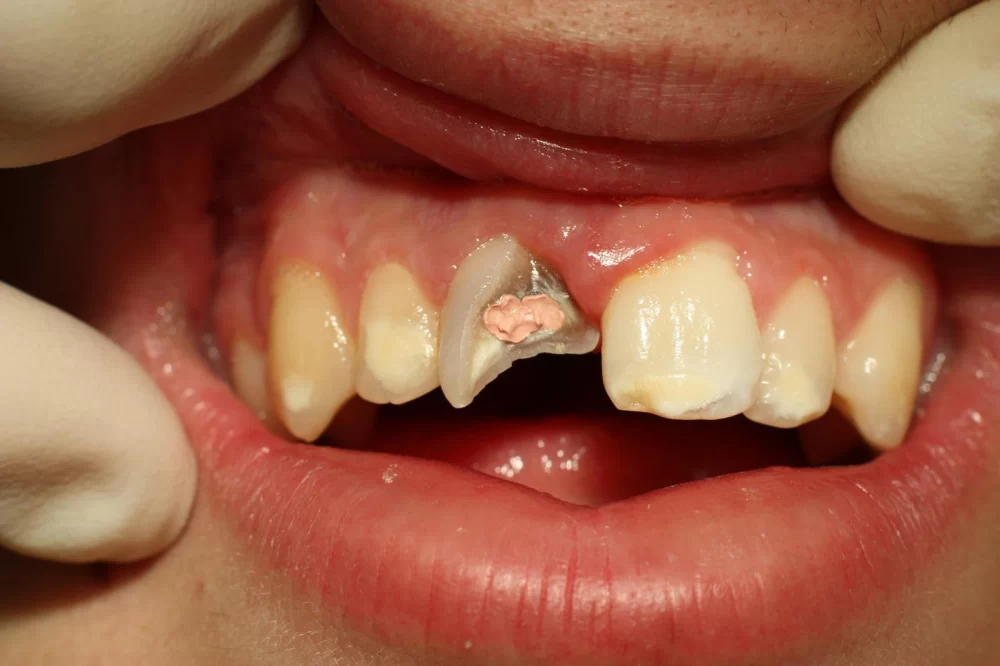
Understanding the Causes of Toothache from a Broken Tooth
Experiencing a toothache from a broken tooth can be both painful and distressing. A toothache can occur for many reasons, but when caused by a fractured or broken tooth, the pain may be especially intense and persistent. Whether from an accident, trauma, or decay, a broken tooth exposes the sensitive inner layers of the tooth, including the nerve. The result is often sharp, throbbing pain that can disrupt your daily life. Let’s explore the common causes and symptoms associated with toothaches caused by broken teeth and how you can manage the pain while waiting for professional dental care.
1. Causes of a Broken Tooth Leading to Toothache
A broken tooth can occur from a variety of situations. Some of the most common causes include:
- Trauma or Injury: A fall, car accident, or sports injury can cause a tooth to crack or break, often leading to a toothache.
- Tooth Decay: If a cavity is left untreated, it can weaken the structure of the tooth, causing it to break under pressure.
- Chewing Hard Foods: Biting into hard objects, such as ice or hard candy, can cause a tooth to crack or chip.
- Teeth Grinding: People who grind their teeth, especially during sleep, may gradually wear down the enamel, causing the tooth to break over time.
2. Identifying the Symptoms of a Broken Tooth and Toothache
If you’re experiencing a toothache, it’s important to understand the symptoms that could indicate your tooth is broken. Here are some common signs:
- Sharp or Throbbing Pain: This is the most obvious symptom of a toothache caused by a broken tooth. The pain may be constant or come and go, and it often worsens with pressure or chewing.
- Visible Chips or Cracks: You may notice visible cracks, chips, or fractures in your tooth, especially if the pain is localized to a specific tooth.
- Swelling or Redness: If there is an infection or the injury caused damage to the soft tissue around the tooth, you may notice swelling or redness in the gums.
- Increased Sensitivity: A broken tooth can expose the nerve inside, making your tooth more sensitive to hot, cold, or sweet foods and drinks.
How to Treat a Toothache Caused by a Broken Tooth
While it’s always recommended to seek professional dental care as soon as possible, there are several ways to manage the pain and prevent further damage to the broken tooth before you can visit a dentist.
3. Immediate Home Remedies for Toothache Relief
Until you can get to a dentist, there are several home remedies that may help alleviate the discomfort caused by a broken tooth. Here are some quick fixes you can try:
- Cold Compress: Applying a cold compress to the outside of your cheek near the broken tooth can help reduce swelling and numb the pain. Hold the compress for 15–20 minutes at a time, with breaks in between.
- Over-the-Counter Pain Relievers: Non-prescription pain relievers like ibuprofen or acetaminophen can help reduce inflammation and relieve pain. Be sure to follow the recommended dosage on the label.
- Saltwater Rinse: Rinsing your mouth with warm salt water can help clean the area around the broken tooth and soothe irritation. Simply mix a teaspoon of salt in a cup of warm water and rinse for 30 seconds before spitting it out.
- Clove Oil: Clove oil has natural analgesic properties that can help numb the pain. Apply a small amount of clove oil to a cotton ball and gently rub it on the painful area.
- Temporary Dental Filling Material: If your broken tooth has a large cavity or missing part, you can use a temporary dental filling material (available over the counter) to cover the exposed area until you can see a dentist.
4. Avoiding Foods and Habits That Can Make the Pain Worse
While waiting for professional care, it’s important to avoid actions and foods that could worsen the pain or further damage the tooth:
- Avoid Chewing on the Affected Side: To prevent aggravating the broken tooth, try chewing on the opposite side of your mouth until you can visit the dentist.
- Stay Away from Hot or Cold Foods: As broken teeth are often sensitive, consuming very hot or cold foods and drinks can intensify the pain. Stick to lukewarm or room-temperature foods until you receive treatment.
- Avoid Hard or Crunchy Foods: Hard foods like nuts, ice, or hard candy can further damage a broken tooth. Soft, easy-to-chew foods will be less painful.
When to See a Dentist for a Broken Tooth
Although home remedies can provide temporary relief, seeing a dentist is essential to properly treat a broken tooth and prevent complications. A dentist will assess the severity of the break and recommend an appropriate course of action. Here are some signs that you should seek immediate dental care:
5. Signs You Need Immediate Dental Attention
- Severe or Persistent Pain: If the pain from your broken tooth doesn’t subside with over-the-counter pain relievers or home remedies, it’s time to visit a dentist.
- Visible Infection or Abscess: If you notice pus or a foul odor coming from the broken tooth or surrounding gums, you may have an infection that requires professional treatment.
- Difficulty Eating or Speaking: If the broken tooth is making it difficult for you to chew, eat, or speak, it’s important to get immediate dental care to restore your comfort and function.
- Extreme Sensitivity: If the sensitivity to hot or cold is unbearable, or if you notice bleeding from the broken tooth, you should seek immediate professional attention.
What to Expect at the Dentist for a Broken Tooth
When you visit a dentist for a broken tooth, they will first perform a thorough examination of the affected tooth and take X-rays to assess the damage. Depending on the severity of the break, the treatment options may include:
- Filling or Bonding: If the break is minor, your dentist may apply a filling or bonding material to restore the tooth.
- Crown: For larger breaks, a dental crown may be placed to protect the tooth and restore its functionality.
- Root Canal Treatment: If the break exposes the nerve of the tooth, a root canal may be necessary to remove the infected pulp and save the tooth.
- Extraction: In some cases where the break is too severe, the tooth may need to be extracted.
Regardless of the treatment, your dentist will ensure that your pain is managed and that your tooth is restored to its best possible condition. In many cases, a broken tooth can be successfully treated, allowing you to return to your normal activities with a smile.







 Kid's Dental4.0 (280 review)
Kid's Dental4.0 (280 review) North Scottsdale Dental4.0 (211 review)
North Scottsdale Dental4.0 (211 review) Tend East Nashville4.0 (319 review)
Tend East Nashville4.0 (319 review) Lake Forest Dental Associates4.0 (230 review)
Lake Forest Dental Associates4.0 (230 review) Picture Perfect Smile5.0 (418 review)
Picture Perfect Smile5.0 (418 review) Great Day Dental East4.0 (221 review)
Great Day Dental East4.0 (221 review) The Importance of Oral Health Education During Pregnancy for a Healthy Pregnancy
The Importance of Oral Health Education During Pregnancy for a Healthy Pregnancy Best Tips for Brushing Your Teeth Properly for Healthy Gums: Essential Techniques for Oral Health
Best Tips for Brushing Your Teeth Properly for Healthy Gums: Essential Techniques for Oral Health Why Skipping Dental Checkups Can Lead to Bigger Oral Health Problems
Why Skipping Dental Checkups Can Lead to Bigger Oral Health Problems Advantages of Porcelain Dental Restorations
Advantages of Porcelain Dental Restorations How Can Diabetes Cause Tooth and Gum Problems? Preventing and Managing Oral Health Issues
How Can Diabetes Cause Tooth and Gum Problems? Preventing and Managing Oral Health Issues Healthy Habits for Promoting Good Oral Health and Hygiene: Tips for a Healthy Smile
Healthy Habits for Promoting Good Oral Health and Hygiene: Tips for a Healthy Smile